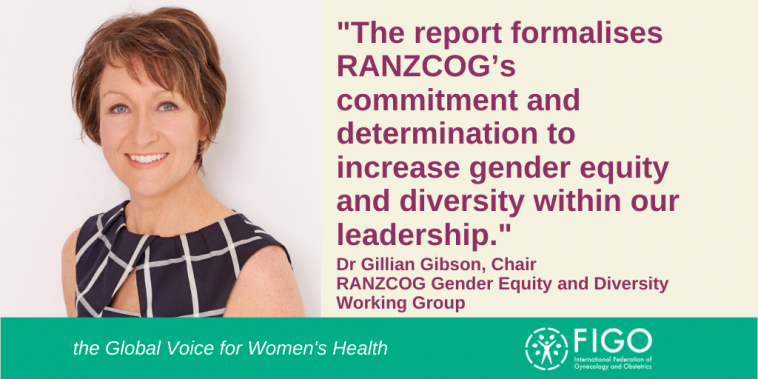Gender equity and diversity amongst OBGYNs
During FIGO’s 2019 Universal Health Coverage (UHC) campaign, we repeatedly highlighted that gender equity must be at the heart of health for all.
We know that the global women’s health community still has a long way to go.

FIGO welcomes the launch of the first Gender Equity and Diversity Report from RANZCOG (Royal Australian and New Zealand College of Obstetricians and Gynaecologists), a FIGO National Member Society and the local hosts of our XXIII World Congress.
Dr Gillian Gibson, Chair of RANZCOG’s Gender Equity and Diversity Working Group, spoke to FIGO about this insightful, ambitious and timely step forward.
In order to continue to advocate for women and their families, RANZCOG must be representative of the community. We were spurred into action following a presentation from one of our Fellows that showed evidence of a startling gender gap in the upper echelons of the College.
RANZCOG has the highest percentage of women members in comparison to other medical colleges, with over 80 percent of trainees who are female, but the lowest representation of women in top level leadership. With this heightened awareness of gender inequities and bias experienced by RANZCOG members, the Group was formed with the objectives of creating policies and enacting processes that would improve gender equity, inclusion and diversity.
Like any challenges individuals or organisations face, the most immediate one for the College was to admit we had a problem. The most important thing you can do is face what’s in front of you head on.
The Gender Equity and Diversity Report formalises RANZCOG’s commitment and determination to increase gender equity and diversity within our leadership. Research has shown that gender equality is linked with a number of health, economic and social benefits, and I would encourage readers to explore an excellent examination of this issue by VicHealth, supported by the Victorian Government, Australia.
It is widely recognised that more diverse groups make better decisions. Therefore, we need to look at who is involved in governance that enables the College to do its work – from the RANZCOG Board to various committees and other groups – in order to optimally inform strategic priorities and conduct College activities.
Actions we have committed to include, but are not limited to:
- consideration for a minimum target of 40 percent female and 40 percent male Board representation for all future RANZCOG Boards
- at College-affiliated meetings the targets for speakers will be minimum 30 percent women in 2021, minimum 40 percent in 2022 and 50 percent in 2023.
We recognise that burnout in the OBGYN profession is a reality among both men and women, but women are more likely to juggle careers while shouldering a disproportionate amount of the domestic and family load. Self-care is a critical virtue, as well as having workplaces that are safe and have good, empathetic management systems.
With RANZCOG committing to developing policies that encourage flexible work hours, job sharing and taking parental leave, our members can better manage their wellbeing, and also entertain leadership roles that build confidence, skills and talent applicable to future positions.
There is a tendency to lack confidence in the ability to lead (perceived capability bias), particularly among women with few role models. I have been fortunate to have mentors who have seen potential that I haven’t necessarily seen in myself. This has opened up career and professional development opportunities.
While I am still very much a hands-on clinician, I have come to appreciate you can positively influence care for a far greater number by leading in health policy. I believe the maxim “if you can see it, you can be it,” and hope my efforts might encourage more women colleagues into leadership positions.
In the Gender Equity and Diversity Working Group, we found it was valuable to consult with our membership on their views on gender and diversity representation, share research and evidence and, most importantly, present them with solutions. Buy-in is critical to making any change happen. Unless you win support for your ideas, from people at all levels, big ideas never seem to take hold or have the impact you want.
The Report clearly outlines the phases of work, what’s involved, implementation and timeframes. It is also important to keep members, the broader profession and all of your stakeholders updated on your progress, and RANZCOG has committed to reporting annual gender and diversity metrics.
Some challenges seem enormous, but if you remain centered and full of awareness, no challenge is too big to meet.